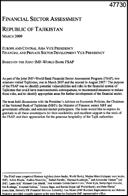World Bank Financial Sector Assessment Program (FSAP)
Financial intermediation in Tajikistan has deepened in recent years, albeit from a low base. This is reflected in the overall growth of the financial system, greater diversification, and the expansion of lending to previously under-served sectors, such as agriculture and small- and medium-sized enterprises.
Even after the expansion, however, the financial sector remains small and cannot serve all the financing needs of the economy. While banks are generally well capitalized and liquid, their rapid growth has brought new risk exposures that should be carefully monitored and appropriately addressed. In particular, rapid loan growth could lead to a build-up of unrecognized credit risk and give rise to an increase in non-performing loans (NPLs).
Because of extensive dollarization, the exposure of banks to exchange-rate induced credit risk is another significant cause for concern. Also, the exceptionally rapid growth of non-resident deposits without clear knowledge of their sources exposes the banking system to reputational risk.
Significant strengthening of the regulatory and supervisory framework will be needed to sustain the system’s health in the face of rapid growth. Governance in the financial sector needs significant strengthening. Improvements are needed to ensure the integrity of the regulatory bodies and to guarantee that all financial transactions are conducted at arms' length and priced on a market basis. Fair and transparent resolution of the large stock of distressed cotton debt would demonstrate the government’s commitment to market principles and good governance.

